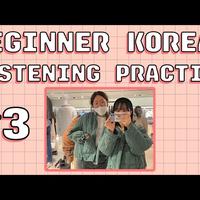Beginner Korean Comprehensible Input - 친구랑 쇼핑하는 사진
Koreanisch für Anfänger Comprehensible Input - Einkaufen mit einem Freund
Beginner Korean Comprehensible Input - Photos of shopping with friends
Beginner Korean Comprehensible Input - Fotos de compras con amigos
Coréen pour débutants - Faire des achats avec un ami
Input comprensibile per i principianti del coreano - Shopping con un amico
Beginner Korean Comprehensible Input - 友達とショッピングする写真
Beginner Koreaans begrijpelijke input - Winkelen met een vriend
Koreański dla początkujących - zdjęcia z zakupów z przyjaciółmi
Entrada Compreensível em Coreano Iniciante - Fotos de compras com amigos
Yeni Başlayanlar İçin Korece Anlaşılır Girdi - Bir Arkadaşla Alışveriş
Розуміння корейської мови для початківців - шопінг з другом
初级韩语输入法 - 和朋友一起购物的照片
안녕하세요.
한국어 패치의 난주입니다.
This is Nanju for the Korean patch.
오늘은 다른 친구랑 쇼핑을 갔다 왔어요.
Heute war ich mit einer anderen Freundin einkaufen.
Today, I'm going to go with another friend shopping.
今日は他の友達と
한번 볼까요?
Schauen wir es uns an.
Shall we take a look?
나랑 내 친구는
Me and my friend are using
私と私の友達は
서로의 옆에 붙어 있지?
Sie kleben nebeneinander, oder?
Are you stuck next to each other?
お互いの隣にくっついているよね?
나랑 내 친구는
me and my friend
지금 같이 사진을 찍고 있어.
We're taking a picture together.
뭘로 사진을 찍고 있지?
What are you taking a picture of?
何で写真を撮っているんだろう?
내 친구의
My friend's
私の友人の
핸드폰 카메라로
携帯電話のカメラで
사진을 찍고 있어.
나랑 내 친구는 서로 같은 잠바를 입고 있어.
Me and my friend are wearing the same jamba.
그리고 또 같은 게 뭐가 있지?
And what else is the same?
そして、また同じようなものがあるでしょ?
아 나랑 내 친구
oh me and my friend
둘 다 마스크를 끼고 있어.
They're both wearing masks.
二人ともマスクをしている。
그럼 이제 뭐가 다른지 볼까?
So let's see what's different.
では、何が違うのか見てみましょうか?
나는 안경을 끼고 있고
i am wearing glasses
私はメガネをかけていて
내 친구는 안경을 안 끼고 있어.
My friend doesn't wear glasses.
私の友達はメガネをかけてない。
내 친구는 앞머리가 있고
my friend has bangs
나는 앞머리가 없어.
I don't have bangs.
나는 뽀글뽀글 파마머리고 내 친구는
I have soft, permed hair and my friend
생머리야
straight hair
生머리だ
네 친구는 검은색
your friend is black
머리띠를 하고 있고 나는 머리띠를 안 하고 있어.
I'm wearing a headband and I'm not wearing a headband.
三つ編みをしていて、私は三つ編みをしていない。
그리고 나는
and i
호주머니에 손을 넣고 있고
I have my hands in my pockets
ポケットに手を入れていて
내 친구는 핸드폰을
my friend has a cell phone
손으로 잡고 있어.
Hold it in your hand.
내 친구의 핸드폰 색깔은 무슨 색이지?
What color is my friend's cell phone?
연보라색이네~
It's light purple
나는 내 친구를
i am my friend
보고 있고 내 친구는 정면을 보고 있어.
I'm looking and my friend is looking at the front.
見ていて、友達は正面を見ている。
그럼 우리 주변을 볼까?
So let's look around us.
우리는 옷 가게에 있어서
We're in a clothing store
옷들이 많이 걸려 있어.
A lot of clothes are hanging.
그리고 내 뒤에는
and behind me
마네킹이 있어.
I have a mannequin.
여기도 마네킹이 있어.
We have a mannequin here too.
마네킹은 자켓을 입고 있는데
체크무늬야
그리고 내 친구 뒤에 있는 사람도
And the person behind my friend
자켓을 입고 있어.
I'm wearing a jacket.
사람은 줄무늬 자켓을 입고 있네.
The person is wearing a striped jacket.
그리고 내 친구 뒤에 있는 사람은
머리를 묶고 있어.
I'm tying my hair up.
이 사진에 사람은 몇 명이지?
How many people are in this photo?
나 한 명.
One person.
내 친구 두 명.
Two of my friends.
내 친구 뒤에 사람 세 명
그리고 어 여기 마네킹 뒤에도 사람이 있었네.
And uh, there were people behind the mannequins here.
그래서 네 명 총 4 명의 사람이 있어.
So there are four people in total.
마네킹 뒤에 있는 사람은
비닐 봉지를 가지고 있네.
You have a plastic bag.
그 비닐봉지 안에는 하얀색 박스가 들어 있어.
Inside the plastic bag is a white box.
그래서 나랑
내 친구가 같은 잠바를 입고
My friend wears the same jumper and
사진을 찍었어.
내 친구의 핸드폰 카메라로
나랑 내 친구는 같은 점도 있지만 다른 점도 있었어.
Me and my friend had some things in common, but also some differences.
내 친구는 앞머리가 있고
나는 앞머리가 없고
나는 안경을 끼고 있고 내 친구는 안경을 안 끼고 있어.
그리고 나는 호주머니에
손을 넣고 있고 내 친구는
I'm putting my hand in and my friend is saying
카메라를 손으로 잡고 있어
Hold the camera in your hand
어때? 오늘도 새로운 문법이나 단어를 습득했어?
how is it? Did you learn any new grammar or vocabulary today?
나랑 내 친구가 같이 옷을 사러 갔는데
Me and my friend went shopping for clothes together.
둘 다 똑같은 옷이 마음에 들어서
They both liked the same outfit, so they decided to use
같이 입어봤어.
tried on together
너네가 생각할 때는 누가 더 잘 어울리는 것 같애? 나?
Who do you think suits you better? me?
아니면 내 친구?
Or my friend?
누가 더 잘 어울리는지 댓글 남겨주면
Leave a comment telling us who you think looks better.
누가 더 잘 어울리는지 내 친구한테 말해줄께
I'll tell my friend who looks better.
사실 우리 둘이 서로 내기를 했거든!
You two bet each other!
오늘도 영상 봐줘서 너무 고맙고
Thank you so much for watching the video today
혹시 궁금한 게 있거나 아니면 좋은 아이디어 가 있으면
If you have any questions or have any good ideas
댓글이 남겨줘!
Leave a comment!
그러면
다음에 보제이~

